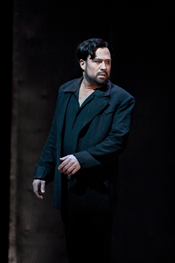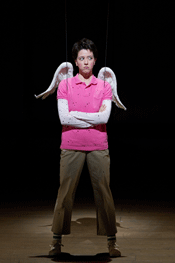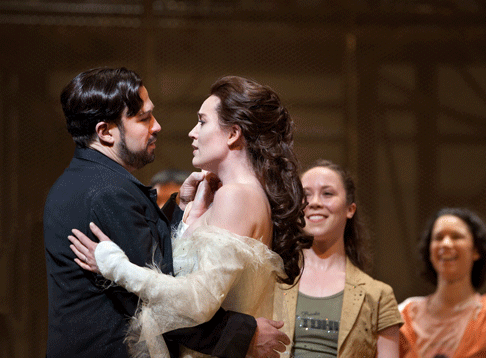Recently in Reviews
English Touring Opera are delighted to announce a season of lyric monodramas to tour nationally from October to December. The season features music for solo singer and piano by Argento, Britten, Tippett and Shostakovich with a bold and inventive approach to making opera during social distancing.
This tenth of ten Live from London concerts was in fact a recorded live performance from California. It was no less enjoyable for that, and it was also uplifting to learn that this wasn’t in fact the ‘last’ LfL event that we will be able to enjoy, courtesy of VOCES8 and their fellow vocal ensembles (more below …).
Ever since Wigmore Hall announced their superb series of autumn concerts, all streamed live and available free of charge, I’d been looking forward to this song recital by Ian Bostridge and Imogen Cooper.
The Sixteen continues its exploration of Henry Purcell’s Welcome Songs for Charles II. As with Robert King’s pioneering Purcell series begun over thirty years ago for Hyperion, Harry Christophers is recording two Welcome Songs per disc.
Although Stile Antico’s programme article for their Live from London recital introduced their selection from the many treasures of the English Renaissance in the context of the theological debates and upheavals of the Tudor and Elizabethan years, their performance was more evocative of private chamber music than of public liturgy.
In February this year, Albanian soprano Ermonela Jaho made a highly lauded debut recital at Wigmore Hall - a concert which both celebrated Opera Rara’s 50th anniversary and honoured the career of the Italian soprano Rosina Storchio (1872-1945), the star of verismo who created the title roles in Leoncavallo’s La bohème and Zazà, Mascagni’s Lodoletta and Puccini’s Madama Butterfly.
Evidently, face masks don’t stifle appreciative “Bravo!”s. And, reducing audience numbers doesn’t lower the volume of such acclamations. For, the audience at Wigmore Hall gave soprano Elizabeth Llewellyn and pianist Simon Lepper a greatly deserved warm reception and hearty response following this lunchtime recital of late-Romantic song.
Collapsology. Or, perhaps we should use the French word ‘Collapsologie’ because this is a transdisciplinary idea pretty much advocated by a series of French theorists - and apparently, mostly French theorists. It in essence focuses on the imminent collapse of modern society and all its layers - a series of escalating crises on a global scale: environmental, economic, geopolitical, governmental; the list is extensive.
For this week’s Live from London vocal recital we moved from the home of VOCES8, St Anne and St Agnes in the City of London, to Kings Place, where The Sixteen - who have been associate artists at the venue for some time - presented a programme of music and words bound together by the theme of ‘reflection’.
'Such is your divine Disposation that both you excellently understand, and royally entertaine the Exercise of Musicke.’
Amongst an avalanche of new Mahler recordings appearing at the moment (Das Lied von der Erde seems to be the most favoured, with three) this 1991 Mahler Second from the 2nd Kassel MahlerFest is one of the more interesting releases.
‘And there was war in heaven: Michael and his angels fought against the dragon; and the dragon fought and his angels, And prevailed not; neither was their place found any more in heaven … that old serpent … Satan, which deceiveth the whole world: he was cast out into the earth, and his angels were cast out with him.’
If there is one myth, it seems believed by some people today, that probably needs shattering it is that post-war recordings or performances of Wagner operas were always of exceptional quality. This 1949 Hamburg Tristan und Isolde is one of those recordings - though quite who is to blame for its many problems takes quite some unearthing.
There was never any doubt that the fifth of the twelve Met Stars Live in Concert broadcasts was going to be a palpably intense and vivid event, as well as a musically stunning and theatrically enervating experience.
‘Love’ was the theme for this Live from London performance by Apollo5. Given the complexity and diversity of that human emotion, and Apollo5’s reputation for versatility and diverse repertoire, ranging from Renaissance choral music to jazz, from contemporary classical works to popular song, it was no surprise that their programme spanned 500 years and several musical styles.
The Academy of St Martin in the Fields have titled their autumn series of eight concerts - which are taking place at 5pm and 7.30pm on two Saturdays each month at their home venue in Trafalgar Square, and being filmed for streaming the following Thursday - ‘re:connect’.
The London Symphony Orchestra opened their Autumn 2020 season with a homage to Oliver Knussen, who died at the age of 66 in July 2018. The programme traced a national musical lineage through the twentieth century, from Britten to Knussen, on to Mark-Anthony Turnage, and entwining the LSO and Rattle too.
With the Live from London digital vocal festival entering the second half of the series, the festival’s host, VOCES8, returned to their home at St Annes and St Agnes in the City of London to present a sequence of ‘Choral Dances’ - vocal music inspired by dance, embracing diverse genres from the Renaissance madrigal to swing jazz.
Just a few unison string wriggles from the opening of Mozart’s overture to Le nozze di Figaro are enough to make any opera-lover perch on the edge of their seat, in excited anticipation of the drama in music to come, so there could be no other curtain-raiser for this Gala Concert at the Royal Opera House, the latest instalment from ‘their House’ to ‘our houses’.
"Before the ending of the day, creator of all things, we pray that, with your accustomed mercy, you may watch over us."
Reviews
![Kate Royal as Euridice [Photo by Marty Sohl courtesy of Metropolitan Opera]](http://www.operatoday.com/ORFEO_Royal_as_Euridice_066.gif)
18 May 2011
Orfeo ed Euridice, Metropolitan Opera
Gluck’s Orfeo is, intentionally, free of clutter. If you cut
out the scenes of balletic rejoicing just before the finale (and I can’t
think of any good reason not to do so), it’s less than ninety minutes of
music.
Gluck’s intention was to isolate the story in three individual
voices, as no opera treating the story of Orpheus had done before. He could
even have made it a monodrama, and in some ways it is one: The roles of
Euridice and Amor are neither large nor intricate in the original Vienna
version of the score. (Euridice’s aria was a Parisian afterthought, as
was Orfeo’s coloratura showpiece in Act I, which may not even be
Gluck’s work. Neither is performed at the Met.)
 David Daniels as Orfeo
David Daniels as Orfeo
The Metropolitan Opera production, directed by Mark Morris, seemed, when it
was first mounted, to be mostly about Isaac Mizrahi’s distracting
costumes for the chorus (some idiot tale about “all the famous people in
history witnessing the story”) and, secondarily, Morris’s jazzy
choreography, almost the only scene-setting we have for Tartaros or Elysium.
There was some story about a guy who goes to the Underworld to bring
back his dead wife, but that came a poor third. On its latest revival, those
miserable costumes are still around, but the chorus do not rush about on their
catwalk portraying furious Furies; they stay sedately in place, out of the
spotlight. The lighting is seldom upon them anyway, and one can ignore their
egregious intrusions and just listen to the way they sing. (Beautifully, with
very precise diction.) Morris’s choreography also seems less to clutter
matters and (I could be wrong here) there may have been cuts in the celebratory
dances. So at last the opera is about Orpheus and Eurydice, a pleasant, nearly
Ovidian, metamorphosis.
 Lisette Oropesa as Amor
Lisette Oropesa as Amor
Antony Walker, an Australian, made an excellent, brisk debut in the pit, and
even at its most languid moments, the musical tension never let up all night:
an energetic performance informed, one suspects, by a background in the
current, danceable Early Music style of doing galant music. He plays
well with singers, too—this staging requires the chorus to keep time,
beating their hands on the rails of their bleachers, at certain moments.
David Daniels is now 45, and countertenors’ voices do not last as long
as, say, Wagnerian sopranos’ do. I hear less of the thrilling sensuality
in his alto that had me gaga in earlier years, less control at the edges of
individual notes, but he has always been a superb musician and a passionate
actor, and his Orfeo is a memorable, ardent portrait. When he stands alone,
bereft, at the center of the stage (vertically as well as horizontally) for the
climactic “Che faro senza Euridice,” a clear and simple statement
of anguish, he has earned our total attention and repays it richly. This is
what Gluck’s clarifying reform of opera was all about.
 David Daniels as Orfeo and Kate Royal as Euridice
David Daniels as Orfeo and Kate Royal as Euridice
Lisette Oropesa made a pleasing god of love, the voice pure and clear,
filling the hall, the gestures a minimum of cute excess. Kate Royal made her
Met debut as Euridice, with a voice of distinct color and beauty and an
attractive stage presence, but she did not make terribly much of this pallid
character’s awkward situation, as Danielle de Niese, in striking
contrast, did, and for some reason she had lost her vocal footing for the final
triumphal duet and was unable to regain it.
John Yohalem
![Kate Royal as Euridice [Photo by Marty Sohl courtesy of Metropolitan Opera]](http://www.operatoday.com/ORFEO_Royal_as_Euridice_066.gif)


